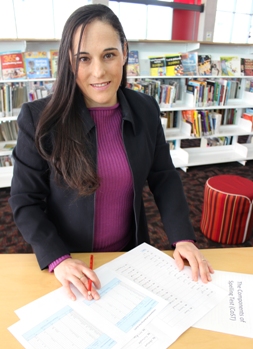 Research
at Charles Sturt University (CSU) has shown how a student's proficiency in
spelling, grammar and punctuation can predict their success with writing.
Research
at Charles Sturt University (CSU) has shown how a student's proficiency in
spelling, grammar and punctuation can predict their success with writing.
Mrs Tessa Daffern from CSU's Research Institute for Professional Practice, Learning and Education (RIPPLE) analysed data from year three and year five NAPLAN Writing Tests and Language Conventions Tests (2012-2013) to expose the relationship between spelling, grammar and punctuation, and compositional writing ability for students in year three and year five.
"I wanted to know how aspects of spelling, grammar and punctuation can be used to predict a child's writing ability and compositional writing quality in the middle and upper primary school years," Mrs Daffern said.
"My research showed that spelling, grammar and punctuation jointly contributed to compositional writing by as much as 43 per cent.
"Spelling was found to be the main predictor of compositional writing while punctuation was not an influential independent predictor."
Mrs Daffern also sought to explore the influence of gender and age in terms of compositional writing. The research showed that spelling is a significant predictor of writing success for both males and females, regardless of age.
The research has highlighted the importance of teaching spelling in primary schools and Mrs Daffern hopes it will be useful to teachers.
"This research has confirmed the importance of teaching spelling in the middle and upper primary school years, not just in the early years of schooling," Mrs Daffern said.
"I also hope this research motivates teachers to encourage proof reading and editing of language convention errors in their classrooms, as well as encouraging other important elements of writing such as vocabulary precision and text cohesion. It also shows that they should not adjust their instruction on the basis of gender when teaching language conventions and compositional writing."
Mrs Daffern recently presented her findings at international conferences in Cyprus and Hungary. She is currently completing her PhD, An examination of spelling acquisition in the middle and upper primary school years, under the supervision of Dr Noella Mackenzie and Dr Brian Hemmings.





Social
Explore the world of social